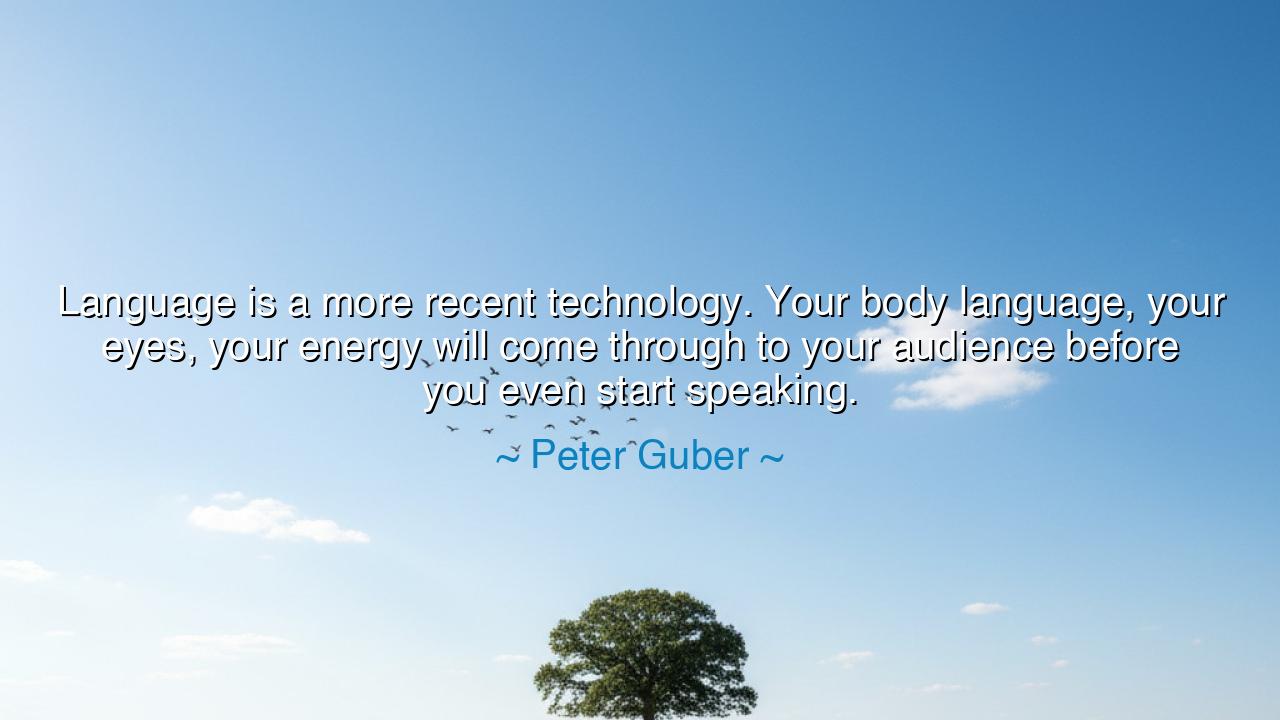
Language is a more recent technology. Your body language, your
Language is a more recent technology. Your body language, your eyes, your energy will come through to your audience before you even start speaking.






Hear the wisdom of Peter Guber, who declared: “Language is a more recent technology. Your body language, your eyes, your energy will come through to your audience before you even start speaking.” This truth, though modern in its phrasing, is ancient in its essence. For long before words were carved into tablets or spoken in courts, mankind spoke with the movement of his limbs, the fire of his gaze, the rhythm of his breath. The body was the first scroll, the eyes the first messengers, the soul’s energy its first song.
Indeed, language is but a tool, a later invention, a sharpened blade forged after millennia of silence filled with gesture, glance, and presence. A child knows this before ever speaking; an infant cries not with words but with the trembling of its frame, the light of its eyes, the tone of its cry. So too the beasts of the field understand: the wolf bares its teeth, the lion lowers its stance, the bird spreads its feathers. All speak without speech. Thus, what Guber calls technology is but the refinement of what nature already gave us—the art of expression without words.
History testifies to this eternal truth. Consider Alexander the Great: before he spoke to his armies, before he promised them conquest or glory, his very presence commanded allegiance. His gaze was fire, his posture unyielding steel. When he stood among his men, their hearts burned, not because of what he said, but because of who he was before he opened his mouth. His energy crossed the silence like thunder, binding thousands in loyalty before syllables ever touched their ears.
Even in the halls of philosophy, body spoke as loud as words. Socrates, though mocked for his appearance, carried himself with a calm so profound that his students remembered his demeanor as much as his teaching. His patience, his gentle eyes, his unshaken composure—all were a kind of body language that spoke of the harmony between inner virtue and outer form. His lessons lived not only in dialogues, but in the silent testimony of his presence.
Thus, Peter Guber’s words are no small reminder. They awaken us to the fact that every encounter begins before the first word is spoken. A frown may undo a speech of a thousand phrases; a warm gaze may soften a heart closed by suspicion. The voice of the body is swifter and often more persuasive than the voice of the tongue. For words may deceive, but energy rarely lies.
The lesson is this: Guard not only your words, but your bearing. Cultivate not only your speech, but your presence. When you enter a room, you are already speaking. When you meet a friend, your eyes declare your intent. When you rise to address the multitude, your energy has already reached them before your syllables begin. Therefore, let your body be the ally of your spirit, not its betrayer.
Practical wisdom lies before you: Stand tall, for posture shapes confidence. Let your gaze be steady, for eyes reveal the soul. Let your energy be disciplined, for it spreads like unseen fire. Train not only in rhetoric but in presence; practice not only in speech but in silence. In this way, your message will carry weight, not as mere sound, but as truth clothed in flesh.
So remember this, O children of tomorrow: language may be a wondrous invention, but it is not the root of human connection. Long before words, we were understood. Long after words fade, our presence will remain. Speak well, yes—but live and move in such a way that even in silence, your very being becomes a message, and your audience hears you before you have spoken a single word.






AAdministratorAdministrator
Welcome, honored guests. Please leave a comment, we will respond soon